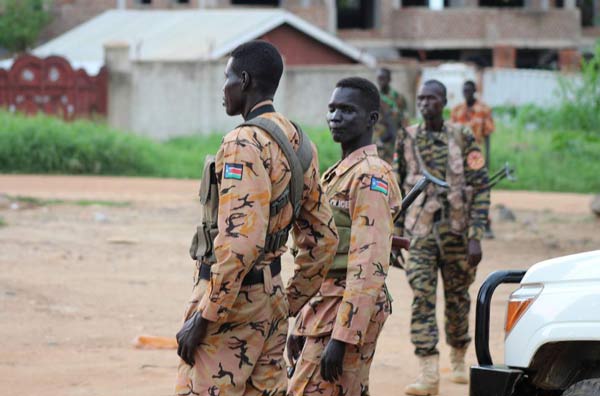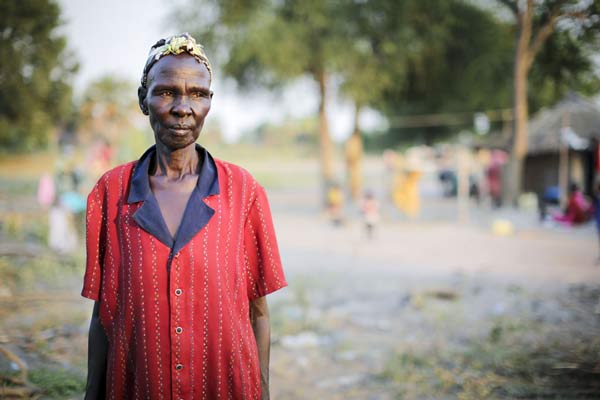
South Sudanese policemen and soldiers stand guard along a street following renewed fighting in South Sudan’s capital Juba, July 10, 2016. REUTERS/Stringer
UN NEWS
‘Appalled’ by heavy fighting in Juba, Ban urges South Sudanese leaders to de-escalate hostilities
10 July 2016
The United Nations is again urging calm in the wake of heavy fighting today in and around the South Sudanese capital of Juba, with the UN mission mobilizing peacekeepers to protect civilians as Secretary-General Ban Ki-moon calls on President Salva Kiir and First Vice-President Riek Machar to do everything within their power to immediately de-escalate the hostilities.
The UN Security Council has also strongly condemned days of violence in the area amid fresh clashes between soldiers of the Sudan People’s Liberation Army (SPLA) and the SPLA in Opposition. Separately, the fighting has also seen UN and diplomatic officials targeted, as the world’s youngest country on Saturday marked the fifth anniversary of its independence.
“I am shocked and appalled by the heavy fighting that is currently taking place in Juba,” Mr. Ban said in a statement strongly urging the country’s leaders to do everything in their power to de-escalate the hostilities immediately and to order their respective forces to disengage and withdraw to their bases.
“This senseless violence is unacceptable and has the potential of reversing the progress made so far in the peace process,” said the UN chief.
According to the Secretary-General, UN compounds and civilian protection sites in Juba have been caught in the cross-fire. Expressing deep frustration that despite commitments by South Sudan’s leaders, fighting has resumed, Mr. Ban said they must take decisive action to regain control of the security situation in Juba.
“[They must also] prevent the spread of violence to other parts of the country; guarantee the safety and security of civilians, United Nations and other personnel; and genuinely commit themselves to the full implementation of the peace agreement,” he stated.
For its part, the UN Mission in South Sudan (UNMISS) expressed outrage at the resumption of violence in Juba today, which it said is severely impacting on the civilian population.
Notes from the Field – Nubian women in Yida
In a press statement, the Mission reports that heavy fighting in Juba town, including in close proximity to the UNMISS compounds at UN House Jebel and Tomping, has prompted approximately 1,000 internally displaced people to flee from the UNMISS protection of civilians site (PoC) 1 into the UNMISS compound at UN House Jebel.
[Civilian protection sites have been up and running in various parts of South Sudan for the past two years and according to its most most recent update, UNMISS estimates that the number of civilians seeking safety in the six sites located on its bases is 169,418.]
The heavy fighting in downtown Juba has forced hundreds of civilians to seek protection at UNMISS’ Tomping base, the statement goes on to say and adds: “The United Nations is gravely concerned about reports that armed forces have prevented civilians from seeking protection.”
Both UNMISS compounds in Juba have sustained impacts from small arms and heavy weapons fire, the Mission is reporting. “The United Nations urges all parties to respect the sanctity of the United Nations and condemns any deliberate targeting of United Nations premises and its personnel,” it adds.
Meanwhile, UN peacekeepers continue to protect displaced civilians at PoC sites 1 and 3. For the safety and security of those displaced civilians, the United Nations urges all parties to respect the civilian nature of the PoC sites. UN peacekeepers are also mobilized to protect UNMISS bases in UN House and Tomping.
“The Special Representative of the Secretary-General has directly called on the leadership at the highest level in South Sudan to immediately restrain their forces, to engage in dialogue to find a political solution to this crisis and to allow access to the United Nations to be able to patrol in order to reassure the civilian population,” the statement concludes.
Just two days ago, the Office of the UN High Commissioner for Refugees (UNHCR) noted that South Sudan has spent much of its short life at war with itself, riven by a political face-off between President Salva Kiir and his then former Vice-President Riek Machar that erupted into full-blown conflict late in 2013. Some 2.4 million people fled their homes in fear, before an August 2015 peace deal ended the major offensives. The country marked the fifth anniversary of its independence on 9 July.
Despite the August 2015 peace agreement that formally ended the war, conflict and instability has spread to previously unaffected areas in the Greater Equatoria and Greater Bahr-El-Ghazal regions. This past month, deadly clashes in Wau resulted in the deaths of more than 40 people, while up to 35,000 fled their homes. Such fighting is characteristic of the trend that produced fresh refugee outflows this year, a UNHCR spokesperson said Friday.
Late yesterday, the UN Security Council strongly condemned the fighting in Juba, South Sudan between soldiers of the Sudan People’s Liberation Army (SPLA) and the SPLA in Opposition, which took place on 7-8 July.
In a press statement, the members of the Council further strongly condemned the separate attacks on UN and diplomatic officials that took place in Juba on July 7. While acknowledging the formation of an investigation committee, they urged the Transitional Government of National Unity to “quickly investigate the attacks, take steps to end the fighting, reduce tensions, and hold those responsible for the attacks to account.”
The Council went on to stress the importance of members of military forces being held accountable for their actions and emphasized the importance of command and control. As such, Council members called on the SPLA, the SPLA in Opposition and all other armed actors to cease hostilities and to allow UNMISS and humanitarian actors access to civilians in need.
Expressing deep concern over the parties’ lack of serious commitment to implementation of the Agreement on the Resolution of the Conflict in the Republic of South Sudan, the Security Council called upon the parties to work together in the Transitional Government to resolve their differences in the spirit of cooperation, and in this regard, welcomed the joint statement made by the President, First Vice-President, and Vice-President appealing for calm.
“The members of the Security Council demanded the parties expedite implementation of all aspects of the Agreement, including key provisions on transitional security arrangements, as a means to restoring peace in South Sudan.

Of Nuer ethnicity, Adhieu Chol moved to Lakes state’s Rumbek long ago to marry a Dinka man from the area. Since September 2015, she has provided sanctuary to many internally displaced people from Unity state looking for safety in Rumbek, South Sudan. Photo: UNHCR/Rocco Nur
On the fifth anniversary of South Sudan’s independence, the members of the Security Council urged South Sudan’s leaders to demonstrate leadership that will bring lasting peace and security to South Sudan.
Also yesterday, the UN Children’s Fund (UNICEF) expressed its “deep alarm” at the renewed violence in South Sudan and called on all parties to respect humanitarian principles and provide unrestricted access to civilians in need. After nearly three years of war, civilians are bearing the brunt of the conflict, with women and children facing the greatest dangers and hardships, the agency added.
“Children and their families in South Sudan have suffered enough from violence, displacement and killings in this brutal conflict. It is time that peace becomes more than agreements on paper, but a reality for those who are most vulnerable,” said UNICEF Regional Director for Eastern and Southern Africa, Leila Pakkala.
At the PoC site in Juba, which was impacted by the outbreak of hostilities on the night of July 8, UNICEF and partners were continuing their support to the displaced population. Teams on the ground are scaling up efforts to provide access to health and nutrition services, drinking water and sanitation to existing and newly displaced families, said UNICEF.
The events in Juba came shortly after escalation of conflict in other parts of the country in recent weeks, disrupting lives and livelihoods. In Wau, where fighting has displaced at least 70,000 people since the end of June, UNICEF said that the agency and its partners are working around the clock to provide assistance to children and their families.
Join mailing list for updates and monthly newsletters
